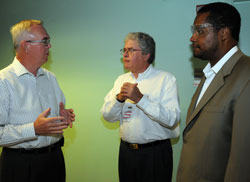 Our tour guide for the Novus International headquarters building today was Don Vondriska, Director of Business Development , pictured on the left here speaking to attendees. As I’ve reported before when covering the facility grand opening, this is a LEED Platinum certified building and very unique. Don took us around and show how they’ve designed with the environment and employees in mind. Everything is open so you can see outside from just about anywhere. The staff leaders have the same size cubicles as everyone else. For those in labs downstairs, there are special pipes that bring sunlight into their work areas. Don says the design really helps with teamwork and collaboration. You’ll hear some chickens in the background because after the office/lab area we walked to an adjacent building where the company conducts some animal research on a small scale.
Our tour guide for the Novus International headquarters building today was Don Vondriska, Director of Business Development , pictured on the left here speaking to attendees. As I’ve reported before when covering the facility grand opening, this is a LEED Platinum certified building and very unique. Don took us around and show how they’ve designed with the environment and employees in mind. Everything is open so you can see outside from just about anywhere. The staff leaders have the same size cubicles as everyone else. For those in labs downstairs, there are special pipes that bring sunlight into their work areas. Don says the design really helps with teamwork and collaboration. You’ll hear some chickens in the background because after the office/lab area we walked to an adjacent building where the company conducts some animal research on a small scale.
Don says they brought media in to help us better understand the diversity of products and science basis of the company. He sees future growth in a lot of different species and science based products that will include equine, companion animals and even humans.
Novus International Media Day Photo Album
You can listen to my interview with Don here:

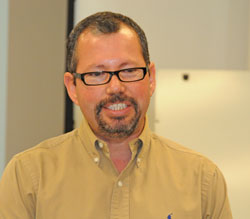 One of the key targets for
One of the key targets for 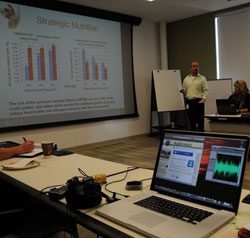 This photo is just to show you how important it is in today’s new media world to have electicity and internet access when you bring the media in for an event of any kind. Today I’ve been attending the
This photo is just to show you how important it is in today’s new media world to have electicity and internet access when you bring the media in for an event of any kind. Today I’ve been attending the 
 and
and 
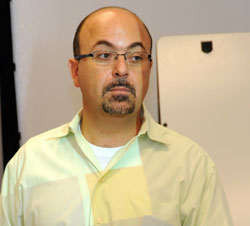 Our first main presentation at the Novus International media day was on
Our first main presentation at the Novus International media day was on 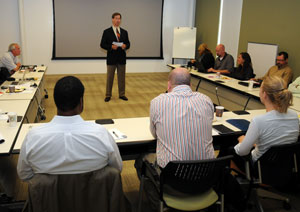 Journalists attending the
Journalists attending the 
 New dynamics are shaping the future for agriculture and farmers need to be watching the markets more closely than ever before to keep ahead of the game, according to market analyst Arlen Suderman with
New dynamics are shaping the future for agriculture and farmers need to be watching the markets more closely than ever before to keep ahead of the game, according to market analyst Arlen Suderman with  The ethanol organization
The ethanol organization  Growth Energy also introduced a new initiative at Farm Progress called
Growth Energy also introduced a new initiative at Farm Progress called  It’s time to get back to work tomorrow and that will be from the
It’s time to get back to work tomorrow and that will be from the